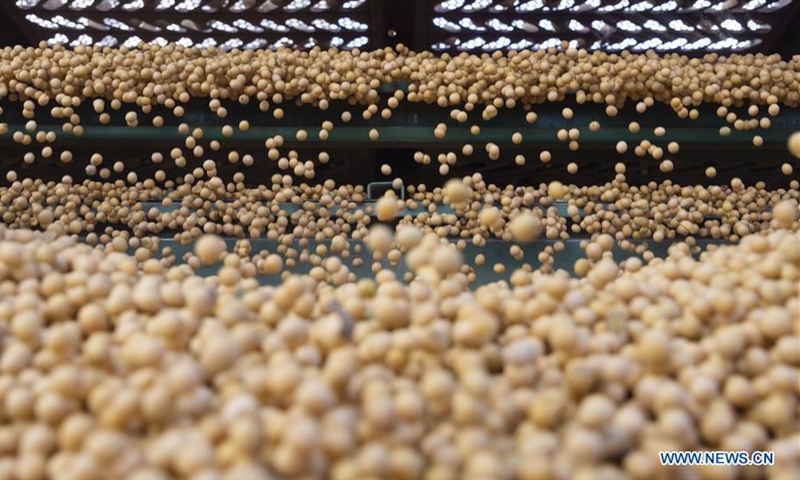Chinese soybean crushing plants close on power curbs, spot soybean meal prices surges

Newly procured soybeans are transferred to silos of China Grain Reserves Group in Harbin, northeast China's Heilongjiang Province, Nov. 8, 2019. A new round of food grain procurement in the autumn period is ongoing in Heilongjiang Province, China's top grain producer.Photo:Xinhua
Dozens of soybean crushing plants have been ordered to shut down and halt production amid increasing demand, rising coal prices and the goal to meet the carbon neutrality. The temporary halt of operation won't have a big impact on market supply and soybean imports, experts have said.
Factories in multiple provinces were reportedly ordered to cut or halt their operations, including some major soybean crushing plants, according to industrial sources and media reports.
An employee with a major domestic processor of soybean, feed and vegetable oil in East China's Jiangsu Province, confirmed with the Global Times on Saturday that due to the curbs in power use at their plant was ordered to halt part of the production and so are other nearby plants.
A source with a Chinese big fodder producer told the Global Times on Saturday that it is true a great number of soybean meal factories across China remained temporarily suspended.
Lower production has supported high prices for soybean oil and soybean meal. The soy oil contract of November on the Dalian Commodity Exchange has jumped by nearly 0.52 percent on Friday. The price hike is in line with the national average price of soybean meal which rose 23 yuan to 3,788 yuan ($586) a ton on Friday, up 0.58 percent from the previous day.
The current round of price hikes has been attributed to low supply expectation caused by power suspension as well as rising global shipping fees, Jiao Shanwei, editor-in-chief of cngrain.com, a website specializing in grain news, told the Global Times on Saturday.
Although there will be a short short-term price increase, the overall market supply will be stabilized as the enterprises have a certain inventory, Jiao said.
The source from big fodder produce also said that some factories produce soybean meal based on orders they received, so it is normal for them to suspend intermittent productions.
It is expected China's soybean imports will hit a new high this year, boosted by the recovery of domestic hog breeding and the booming trade ties between the US and China, he said.
"The fourth quarter is traditionally a peak season for the consumption of edible oil pressing, and the import of soybeans will be relatively large," Jiao said.
In addition to the soybean industry, the impact of this round of shortages have been broad affecting mostly high energy-consuming industries, after a multiple of provincial government issued notices addressing power curbs.
The textile is an industry requires high energy. Tan Ke, head of Keqiao District Commerce Bureau, in Shaoxing city, East China's Zhejiang Province told the Global Times on Saturday that the district has rated factories based on their energy consumption amid the power curbs, some have already resumed productions. As a world-class textile industry hub, the district has the largest professional textile market in Asia, where around 25 percent of the world's global shell fabric is traded annually.
The Tianjin Industrial and Information Technology Bureau also implanted power curbs for one week starting from Thursday, according to a government document seen by the Global Times.
The electricity shortage comes as a result of increased export manufacturing orders after China is the first to recover from the pandemic as well as an increased coal prices, Lin Boqiang, director of the China Center for Energy Economics Research at Xiamen University told the Global Times on Saturday.
As a result of China's rapid economic rebound, China's electricity consumption has grown 16.2 percent in the first half of the year.
To resolve the power shortages and meet the need for decarbonatization eight provinces that have reached their limit for emissions including Jiangsu, Guangdong, Fujian were asked to lower their energy consumption and cut in the carbon intensity according to a notice issued by China's economic planner in August.
Market watchers expected the power curb will be a new norm over the near term.
"The output of the coal-fired power plant cannot keep up with the growing demand for electricity, and clean energy cannot fully replace the coal-fired power plant. Therefore it is expected that power cuts will be the normal state for one to two years," Han Xiaoping told the Global Times on Saturday.
